ONDCP Blog
A Veterans Day Message from Director Kerlikowske
Posted by on November 11, 2012 at 6:27 PM ESTThis Veterans Day, on behalf of the entire staff at the Office of National Drug Control Policy (ONDCP), I would like to express my sincere thanks to our veterans for their service to the United States. We are indebted to you for your courage and unwavering dedication.
ONDCP is committed to strengthening and supporting our military families and veterans and supports programs such as VetCorps that further this work. One year ago, the Community Anti-Drug Coalitions of America (CADCA) launched VetCorps to establish support for military families and service members through community-based coalitions. Programs such as VetCorps help to provide our veterans with the support they need and deserve.
We will continue to work today and every day throughout the year to provide services and support for our military heroes in our effort to give something back to those who are in service to our Nation.
Learn more about our commitment to veterans in the report Strengthening Our Military Families: Meeting America’s Commitment.
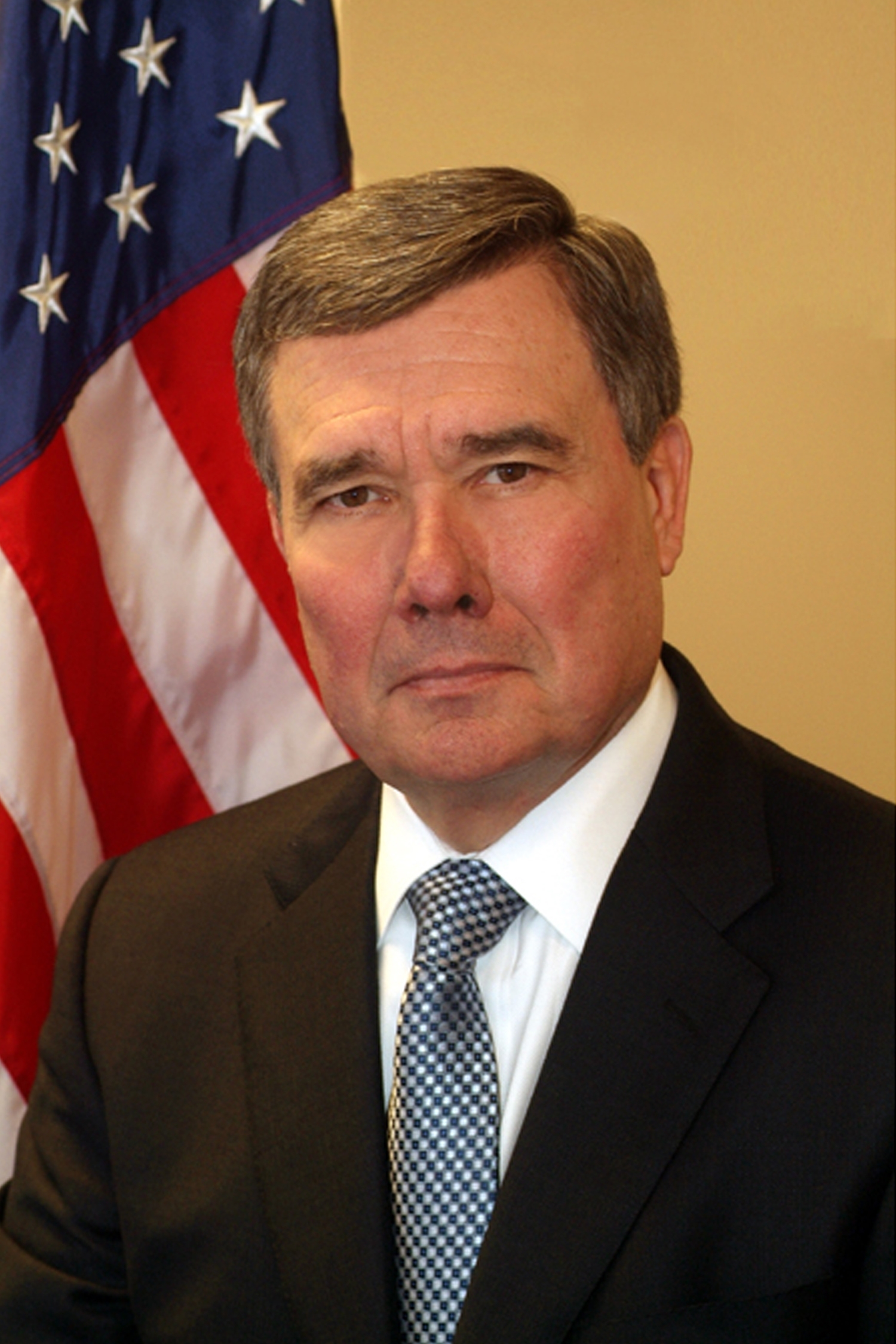 Learn more about
Learn more aboutSchool Nurses: Trusted Student Health Professionals and Agents of Substance Abuse Prevention
Posted by on November 5, 2012 at 4:35 PM ESTFor more than a century, school nursing services have served a critical role in public health and ensuring the academic success of students in America. Particularly over the past five decades, school nurses have become more involved with addressing students’ mental, behavioral, and emotional issues, including substance abuse prevention. In fact, according to the 2007 Government Accountability Office report School Mental Health: Role of the Substance Abuse and Mental Health Services Administration and Factors Affecting Service Provision, school nurses spend one-third of their time providing mental health services, including those for substance abuse.
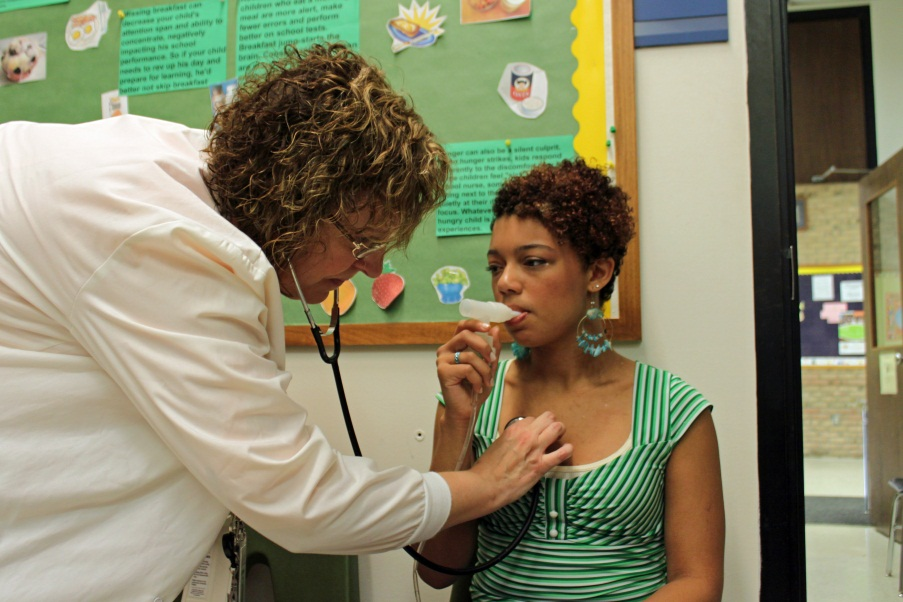
With a presence in 75 percent of the Nation’s schools, school nurses comprise a significant force of professionals who serve as prevention agents. School nurses are in touch with substance abuse trends within the school and in the greater community, enabling them to make educated assessments when students visit their offices.
Many school nurses also spend time in classrooms providing substance abuse prevention curricula, and some with advanced training start treatment support groups. School nurses often work in teams with other specialized instructional support personnel, such as school psychologists, social workers, and counselors, to address substance abuse issues in schools.
When the rate of prescription drug abuse began to increase rapidly, school nurses recognized the trend and took action. The National Association of School Nurses (NASN) got the word out by providing school nurses with data showing that more teens are abusing prescription drugs than illegal drugs (except for marijuana);[i] that prescription medications, along with marijuana, are the drugs of choice among 12- to 13-year-olds;[ii] and that every day, approximately 2,000 young people use a prescription pain reliever non-medically for the first time.[iii]
The NASN provides materials to help school nurses understand and promote drug use prevention, including:
- Current information and links to resources through a Weekly Digest e-News and a “Drugs of Abuse” page, found at www.nasn.org
- Opportunities for online continuing education programs that focus on prescription drug abuse in schools and communities: http://www.nasn.org/ContinuingEducation
- A comprehensive Teen Prescription (Rx) Drug Abuse School Tool Kit: http://smartmovessmartchoices.org/school-tool-kit
- Home 2 Homeroom – educational materials teaming parents with school nurses to prevent and address teen cough-medicine abuse: http://stopmedicineabuse.org/tools-to-take-action/school-nurses
- A school nurse representative in the Five Moms campaign (part of the Stop Medicine Abuse Initiative of the Consumer Healthcare Products Association): http://stopmedicineabuse.org/blog/details/welcoming-peggy-as-the-newest-five-mom
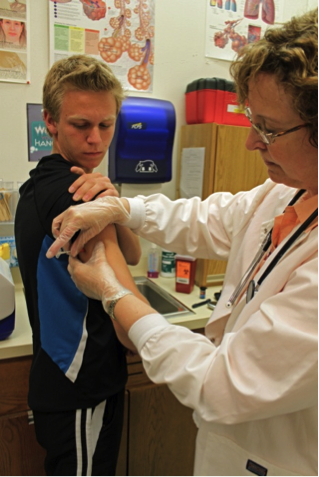 NASN recommends the following tips for school nurses:
NASN recommends the following tips for school nurses:- Familiarize yourself with the national effort and message led by the White House Office of National Drug Control Policy: http://obamawhitehouse.archives.gov/ondcp/prevention-intro/prevention-month%20
-
Order a free Smart Moves, Smart Choices toolkit, which contains:
- Curriculum video series
- Posters/stickers
- Dr. Drew segments
- Access to other resources
-
Team up with other specialized support personnel at your school to provide unified support of Prevention Month.
[i] Results from the 2011 National Survey on Drug Use and Health (NSDUH): National Findings, Substance Abuse and Mental Health Services Administration (SAMHSA), 2012.
[ii] Results from the 2011 National Survey on Drug Use and Health (NSDUH): National Findings, Substance Abuse and Mental Health Services Administration (SAMHSA), 2012.
[iii] SAMHSA, Center for Behavioral Health Statistics and Quality (formerly the Office of Applied Studies), National Survey on Drug Use and Health, 2009 and 2010.
Learn more aboutHIDTA Joins Badges for Baseball
Posted by on November 2, 2012 at 2:58 PM ESTMaryland Congressman Elijah Cummings, Maryland Attorney General Douglas Gansler, National HIDTA Director Michael Gottlieb, and Washington-Baltimore HIDTA Director Thomas H. Carr enjoyed a beautiful autumn day as they launched the Badges for Baseball Program in Baltimore, Maryland.
The Badges for Baseball program aims to reshape and improve the relationship between law enforcement and youth from high-crime areas. Police volunteers help youth refine and improve their baseball skills while also mentoring the young participants and providing positive role models. Badges for Baseball seeks to build a safe and positive environment in which young people have fun, build character, and learn to make good decisions both on and off the field.
Congressman Cummings, who represents the 7th Congressional District in Maryland, referred to the multi-purpose field where the event took place as Baltimore’s “Field of Dreams.” More than 50 young people from Baltimore are expected to participate in the ongoing initiative.
Badges for Baseball is funded in part by the Cal Ripken Sr. Foundation and the Washington-Baltimore High Intensity Drug Trafficking Area (HIDTA) program. The Cal Ripken Sr. Foundation is a non-profit working with underprivileged youth throughout the United States through baseball and softball programming. The Washington-Baltimore HIDTA is funded by the Office of National Drug Control Policy’s High Intensity Drug Trafficking Area program.
HIDTAs have recently placed an increased emphasis on prevention programs like Badges for Baseball. Since 2008, the number of HIDTAs implementing prevention initiatives has increased from four to 20, including all five Southwest Border HIDTA regions. This expansion of prevention initiatives illustrates ONDCP’s commitment to further integrate the law enforcement and prevention communities.
Learn more aboutDirector Joins DEA for Red Ribbon Week Rally
Posted by on October 26, 2012 at 1:21 PM ESTThis week, we join millions of young people across the country to celebrate Red Ribbon Week. Students, parents and educators this week participate by pledging to lead healthy, drug free lives and wear red ribbons while participating in community-wide, anti-drug events.

Director Kerlikowske meets Elementary School Red Ribbon Bookmark Contest Winner, Haley Chilton. (Photo courtesy of DEA)
Red Ribbon Week is also a time to pay tribute to DEA Special Agent Enrique “Kiki” Camarena, whose tragic murder led to the creation of the Red Ribbon Program. Red Ribbon Week is October 23 – 31 each year. On Wednesday, October 24, ONDCP Director Kerlikowske delivered remarks at the annual DEA Red Ribbon Rally at DEA headquarters in Arlington, VA.

Director Kerlikowske joins DEA Administrator Michele Leonhart, Deputy Attorney General James Cole, and other officials for the singing of the National Anthem as the program begins. (Photo courtesy of DEA)

DEA Youth Dancers from Drew Model Elementary School. (Photo courtesy of DEA)
Deputy Attorney General James Cole, DEA Administrator Michele Leonhart, Peggy Sapp, President of the National Family Partnership, and Red Ribbon Youth Contest Winners also attended. They were joined by area youth who presented dance and musical performances for the audience.

Afro Blue, Howard University's Vocal Jazz Ensemble, receives plaque after performance and poses with DEA Administrator Leonhart (Photo courtesy of DEA)
To learn more about Red Ribbon Week and take the pledge to live drug-free, please visit www.redribbonweek.org.
Learn more aboutDirector Kerlikowske Visits Phoenix Multisport
Posted by on October 23, 2012 at 10:50 AM ESTLast Wednesday, Director Kerlikowske visited Phoenix Multisport, a nonprofit “sober active community” for individuals in recovery from substance abuse who are seeking to make a transformation and choose a healthy, active lifestyle. Scott Strode is the Founder and Executive Director of Phoenix who, as an avid athlete, outdoorsman, and recovering alcoholic, understands firsthand the impact and the benefit Phoenix can have for individuals in recovery.
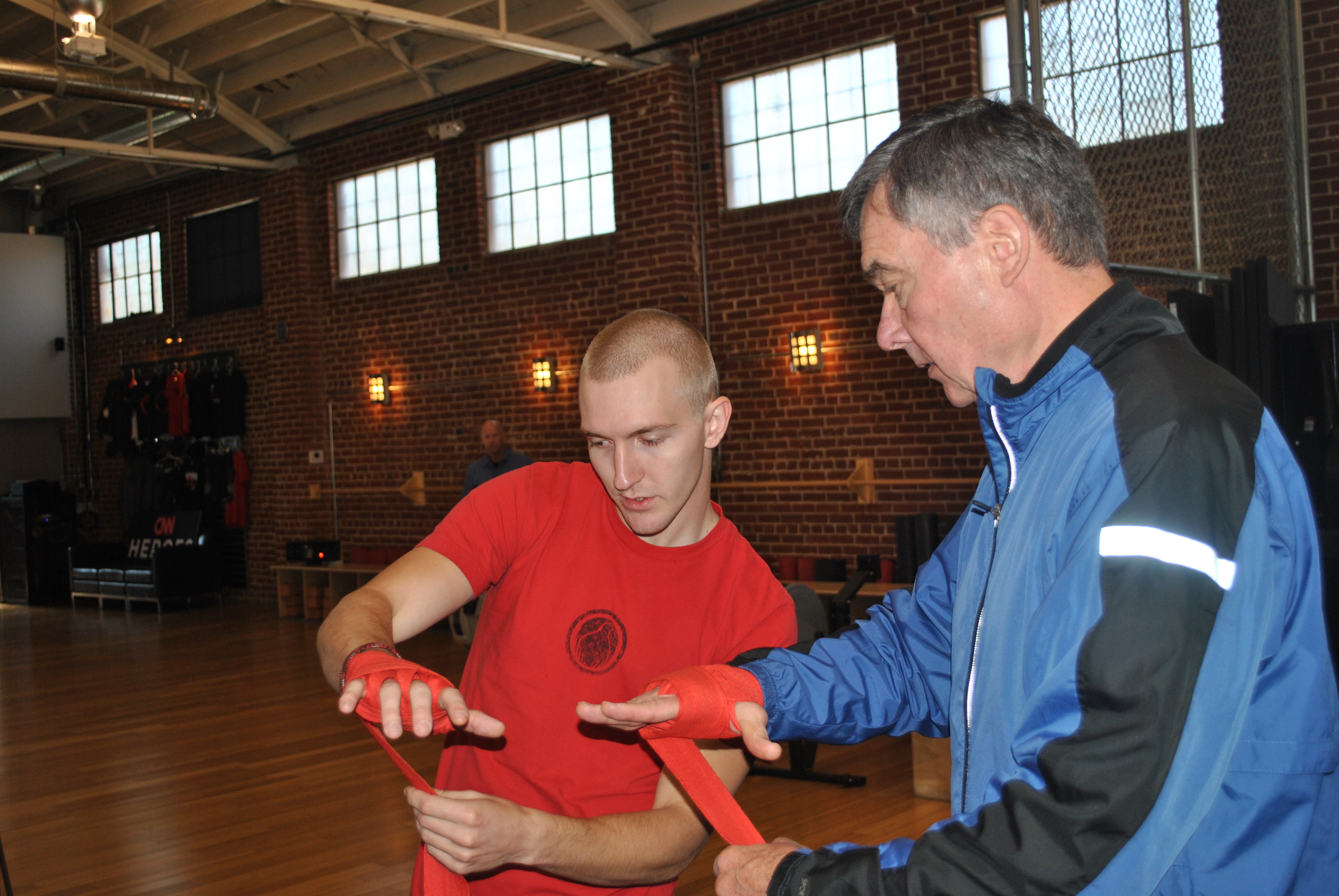
Director Kerlikowske prepares for a training session at Phoenix Multisport.
When Strode began working toward a sober lifestyle, he lost his old friends and social circle. To cope with these changes, Strode began hiking, running, climbing, biking, and boxing, where he found a peer network to help him in his recovery.

Director Kerlikowske and Scott Strode in front of Phoenix Multisport.
Phoenix provides the same type of network Strode found to be invaluable in his own recovery. Strode and 14 staff members offer support through sport with approximately 40 free events each week to anyone who is 48 hours sober. With chapters in Boulder, Denver and Colorado Springs area, Phoenix has seen over 6,000 individuals participate in its programming. Phoenix also has a special program offering support to members of the military and veterans.
CNN praised Strode for his work by naming him a CNN Hero in 2012. He was also featured in Newsweek, Comcast’s Newsmakers program, Renew Magazine, and a 25 minute documentary called “Turning Point.”

Director Kerlikowske with the Phoenix Multisport team.
Learn more aboutAdvocates for Action Guest Post: Turning Tragedy into Purpose
Posted by on October 19, 2012 at 12:40 PM ESTAt the time our son David died in June 2010 after smoking K2, virtually no one had heard of this synthetic drug. There was literally no information from the scientific community available—it was just too new. We made a decision very early on that we needed to do something; we needed to share our story in the hope that we could prevent this from happening to another family.
We came across many terrible stories while searching for answers, but no one seemed to be connecting the dots concerning these synthetic cannabinoids. With an abundance of people pushing their drugs online and no place for parents and kids to go for the truth, we thought it was important to launch www.k2drugfacts.com. Through this site, we started collecting stories from all over the country and gave families the opportunity to share their experiences.
Working through our Iowa Office of Drug Control Policy and local coalitions, we continue to speak at many high schools, colleges, church groups, EMS providers, and anyone else who will listen to us on the dangers of these drugs. We have done multiple interviews with every local and many national media outlets to help get our message out. This has been a slow, difficult, and painful process, but we know we are making a difference.
We are excited to be working with The Partnership at Drugfree.org and their PACT360 program to continue advocating for action on synthetic drugs—preventing other families from experiencing the tragedy we suffered.
 Learn more about
Learn more aboutFirst-Ever National ‘Above The Influence’ Day
Posted by on October 19, 2012 at 12:33 PM ESTYesterday, ONDCP’s “Above the Influence” Campaign engaged youth from across the country to celebrate its first-ever National “Above the Influence” Day. The keystone event of National Substance Abuse Prevention Month, National “Above the Influence” Day turned the spotlight on teens in a national discussion centered on how America’s young people stay “above” negative influences.
More than 200 teens and community organizations across the Nation participated in National “Above the Influence” Day by taking part in various youth-focused activities derived from the campaign, such as “Tag It,” “Be It” and “Express It.” In addition, approximately 85 communities conducted teen panel discussions on the importance of staying “above the influence”, during which teens shared the positive and negative influences they face, including the pressures to use alcohol and drugs.

Washington, D.C.-area youth participate in an influence-inspired discussion in celebration of National ‘Above The Influence’ Day at the Newseum on October 18, moderated by Carla Brooks, Prevention Services Coordinator, Covenant House Washington.
In Washington, DC, I joined area youth in a panel discussion on how they stay “above it” in their own unique ways. Teens from various community organizations engaged in song, dance, and poetry performances related to their participation in the campaign’s “Express It” activity earlier this year.
Similar activities occurred simultaneously in three featured communities – Aberdeen, Maryland; Elkins, West Virginia; and Elko, Nevada . Young people also joined in the ATI Facebook Challenge to share online what they did in their local communities on National “Above the Influence” Day.

Youth from Aberdeen, Md., pose with Deputy Director Marilyn Quagliotti following their event celebrating the first annual National ‘Above The Influence’ Day at the Boys & Girls Clubs of Harford County on October 18.
America’s success in the 21st century depends in part on its ability to help young people make decisions that will keep them healthy and safe. ONDCP is thrilled to celebrate and recognize teens who are rejecting the pressure of drugs, alcohol, and other risky behaviors and the power of community organizations to support our teens nationwide.
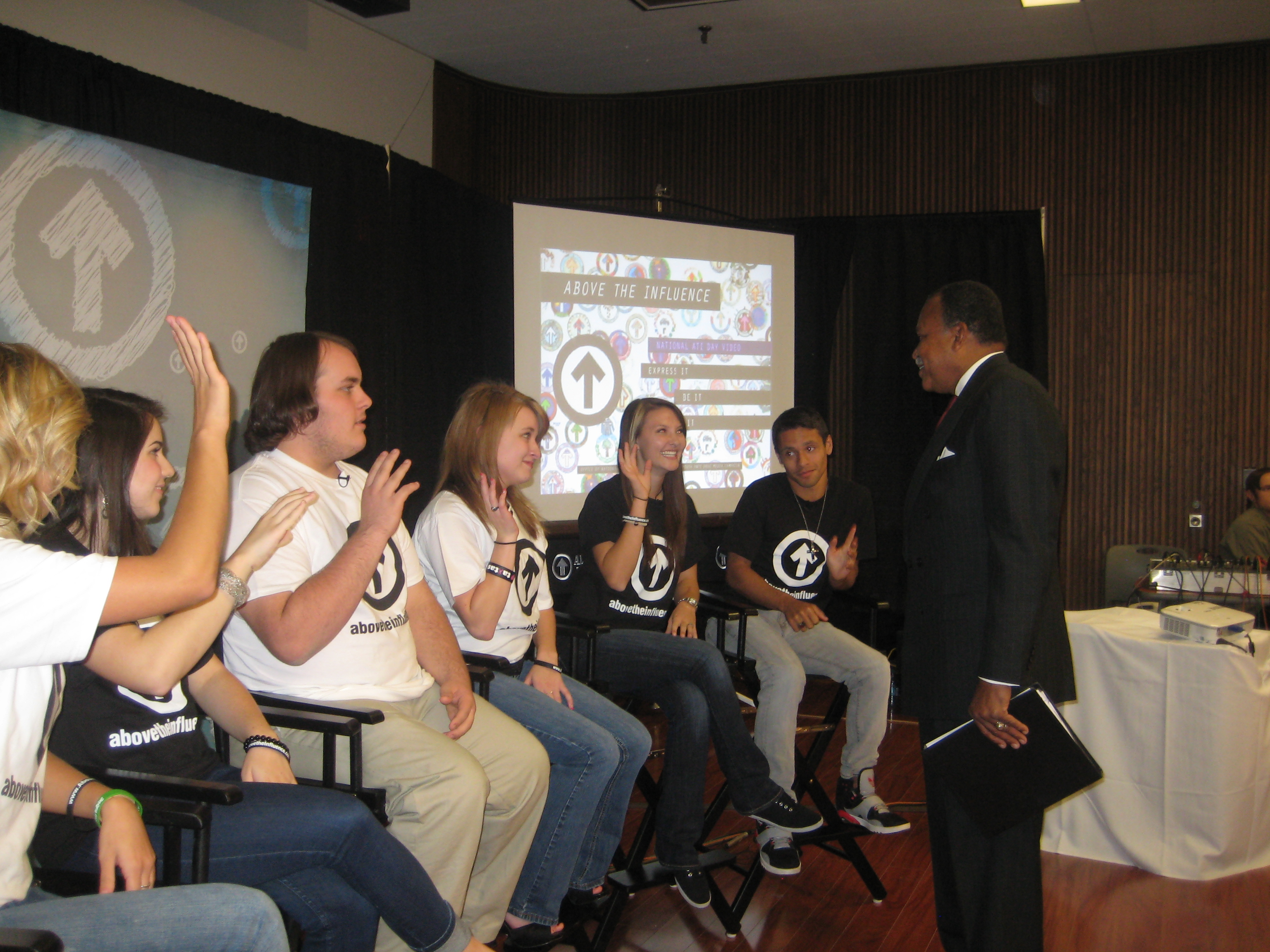
Deputy Director Ben Tucker meets with local partners and teen panelists from Harrison, Randolph and Taylor counties in Elkins, W.Va., during the first annual National ‘Above The Influence’ Day at Davis & Elkins College on October 18.
Throughout National Substance Abuse Prevention Month, we will continue to join with Federal, state, and local partners to highlight the importance of prevention. Our collective efforts are the key to building healthy and safe communities across the country.

Deputy Director David Mineta addresses community partners and area youth participating in a panel discussion on influence during the first annual National ‘Above The Influence’ Day at Elko Convention and Visitors Authority on October 18.
I hope you will get involved and join others in their prevention efforts during this month. Learn what resources and coalitions are located near you. Visit our prevention page for more information and read the President’s 2012 proclamation here.
We know that prevention works and, with your help, we can help keep Americans safe and healthy.
Learn more aboutFamily Checkup: Positive Parenting Prevents Drug Abuse
Posted by on October 17, 2012 at 9:33 AM ESTAs part of National Substance Abuse Prevention Month, the National Institute on Drug Abuse (NIDA) launched a new online tool for parents to use with their families in an effort to prevent drug abuse. Family Checkup: Positive Parenting Prevents Drug Abuse is based on research results from NIDA that highlight the essential role parents play in teaching their families about the consequences of the use and abuse of substances including tobacco, alcohol, marijuana, and prescription drugs.
The Family Checkup, hosted on NIDA’s website, provides questions that guide parents through five skills beginning with communication, then encouragement, negotiation, setting limits, and supervision. Each question, developed by the Child and Family Center at the University of Oregon, presents the skill by first explaining its importance.
Each skill is accompanied by a video demonstrating both a positive and negative example of the skill in action along with suggestions for parents on how to communicate with young people. The information is also available for download as a PDF.
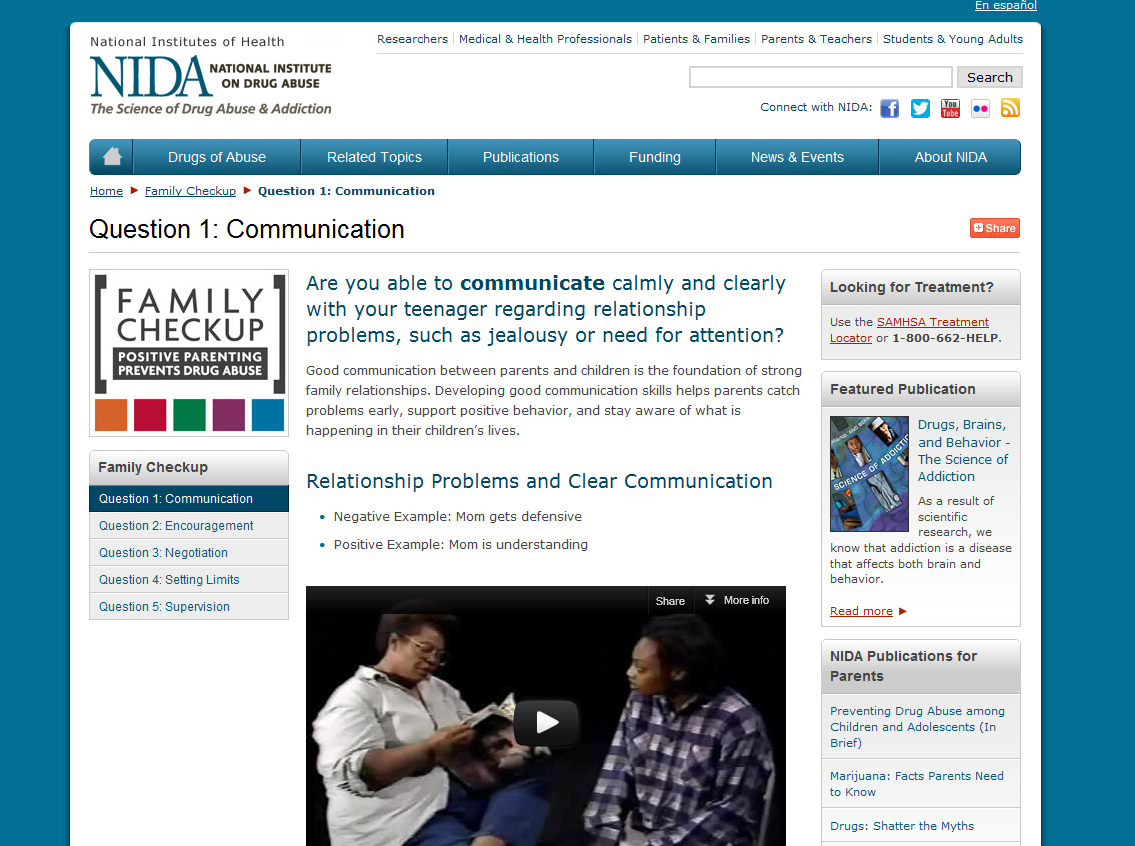
This type of early intervention does a great deal to mitigate the potential for substance abuse and addiction among teens and young adults. By providing accurate information about the risks of substance abuse and addiction, and through practicing positive communication skills, parents can help prevent drug use during the critical teenage years.
Learn more aboutThe Need to Address Game-Day Fan Behavior on College Campuses
Posted by on October 12, 2012 at 1:59 PM ESTDr. Laura L. Forbes is Chair of the American College Health Association (ACHA) Alcohol Tobacco and Other Drug (ATOD) Coalition, and Dr. Tavis J. Glassman is a ACHA ATOD coalition member.
The Alcohol Tobacco and Other Drug Coalition focuses on substance abuse prevention and treatment specific to the college student population. An issue of increasing concern for our coalition is fan behavior associated with college football games. More than a mere nuisance, the high-risk drinking and other drug use associated with game-day fan behavior is a serious public health problem and an issue that universities and surrounding communities need to address.
Scope of the Problem
- The high-risk drinking that takes place on game day is associated with a variety of negative consequences, such as drinking and driving, injury, loss of memory (e.g., blacking out), urinating in public, and vandalism. These consequences are not limited to those actually engaged in alcohol consumption, as non-drinkers also can become victims of secondary negative consequences.
- No research to date has looked at the problem from a national perspective. However, a number of site-specific observational studies have documented the health threats associated with the extreme fan behavior often associated with game day on campus. For example, a 2007 study published in the Journal of American College Health about alcohol-related fan behavior at a large university in the Southeast found that college students and other fans tend to drink more on game day than during other social occasions.
-
While anecdotal evidence indicates illicit drug use plays a part in game-day fan behavior, there’s a strong need for research to explore this connection and more accurately determine its nature, scope, and impact on public health.
Guidelines and Recommendations
- Creating a campus coalition/task force to prepare for and manage game-day issues is a fundamental first step in engaging community and campus officials, such as those in Student Affairs, the Health Center, Counseling Center, Health Promotion Office, University Police Department, Athletics Department, Residence Life, student government, and other student organizations.
- After conducting a needs assessment that looks at issues such as campus and/or community readiness and student substance use, the coalition can begin to plan prevention initiatives that include specific educational efforts, policy implementation, and increased enforcement.
Report in Development
- The ACHA ATOD Coalition is working collaboratively with other organizations and stakeholders to develop a report that will offer recommendations to help colleges and universities address the excessive alcohol consumption and related consequences associated with game-day fan behavior.
- As with many other health issues, there is no easy solution to the challenges associated with game-day fan behavior on campus. However, by opening up a dialogue, stakeholders (including students and fans) can discuss, evaluate, and implement measures to address this issue and help make game days on campus safer for everyone.
____________________________
[1] Champion, H., Blocker, J. N., Buettner, C. K., Martin, B. A., Parries, M., McCoy, T. P., Mitra, A., Andrews, D. W., Rhodes, S. D. (2009). High-rish versus low-risk football game weekends: Differences in problem drinking and alcohol-related consequences on college campuses in the United States. International Journal of Adolescent Medicine and Health, 21(2) 249-62.
[1] Glassman T, Werch CE, Jobli E, Bian H. Alcohol-Related Fan Behavior on College Football Game Day. Journal of American College Health. 2007;56(3):255-260.
Learn more aboutResidents and Businesses Unite to Reduce Substance Abuse in Chicago’s Chinatown
Posted by on October 11, 2012 at 12:16 PM ESTChicago’s tight-knit Chinatown enclave is the second-oldest settlement of Chinese Americans and home to over 75,000 Chinese immigrants and refugees. In an effort to develop a comprehensive program for substance abuse prevention there, the Asian Health Coalition banded together with various sectors of the Chinatown community in 2007 to create the Coalition for Asian Substance Abuse Prevention (CASAP), a grantee in the Drug Free Communities Support Program.
Using the principles outlined in the Substance Abuse and Mental Health Service’s Strategic Prevention Framework as a guide, CASAP aims to prevent adolescent substance use, decrease rates of alcohol and tobacco abuse among adults and youth, and build capacity at the community level to address substance abuse-related issues through a series of environmental and system-level strategies.
Retail access to alcohol is a major contributor to underage drinking, and Chinatown has a high density of stores selling alcohol, with more than 100 liquor stores in a 3-square-mile radius. Police in the area have reported a lack of knowledge and complacency among local businesses regarding proper procedures for serving alcohol. Issues such as excessive alcohol consumption, fake IDs, and serving alcohol to minors remain prevalent problems in the community.
Local assessments have demonstrated there are few resources in Chinatown for adressing this issue, and access to those available is often complicated by cultural and linguistic barriers.

Chicago Police Officer Albert Choi, a member of the Coalition for Asian Substance Abuse Prevention, conducts a Responsible Beverage Server training session in Cantonese.
The Asian Health Coalition recently partnered with the National Restaurant Association, Illinois Liquor Control Commission, Chinatown Chamber of Commerce, and Chinese American Service League to create the first Responsible Beverage Server (RBS) training program in Chinese. The first training session, held in the spring of 2012, attracted over 40 local vendors and servers. Attendees were able to receive free instruction in Mandarin and Cantonese by bilingual trainers from the area who understood the needs of this unique community.
As a result of this collaboration, the National Restaurant Association will make the curriculum available throughout the Nation for Chinese-speaking sellers and servers. Increasing awareness of proper operating procedures will help ensure better compliance among local establishments with state and local laws, create a safer environment, and improve the lives of everyone in the community.
Learn more about
- &lsaquo previous
- …
- 11
- 12
- 13
- 14
- 15
- 16
- 17
- 18
- 19
- …
- next &rsaquo